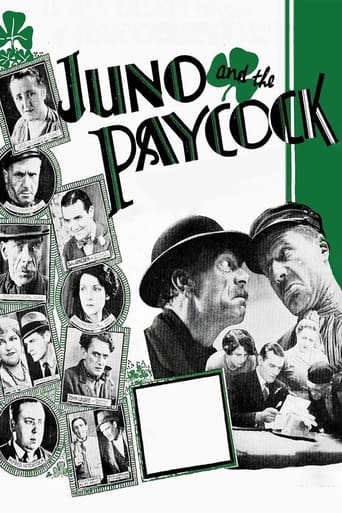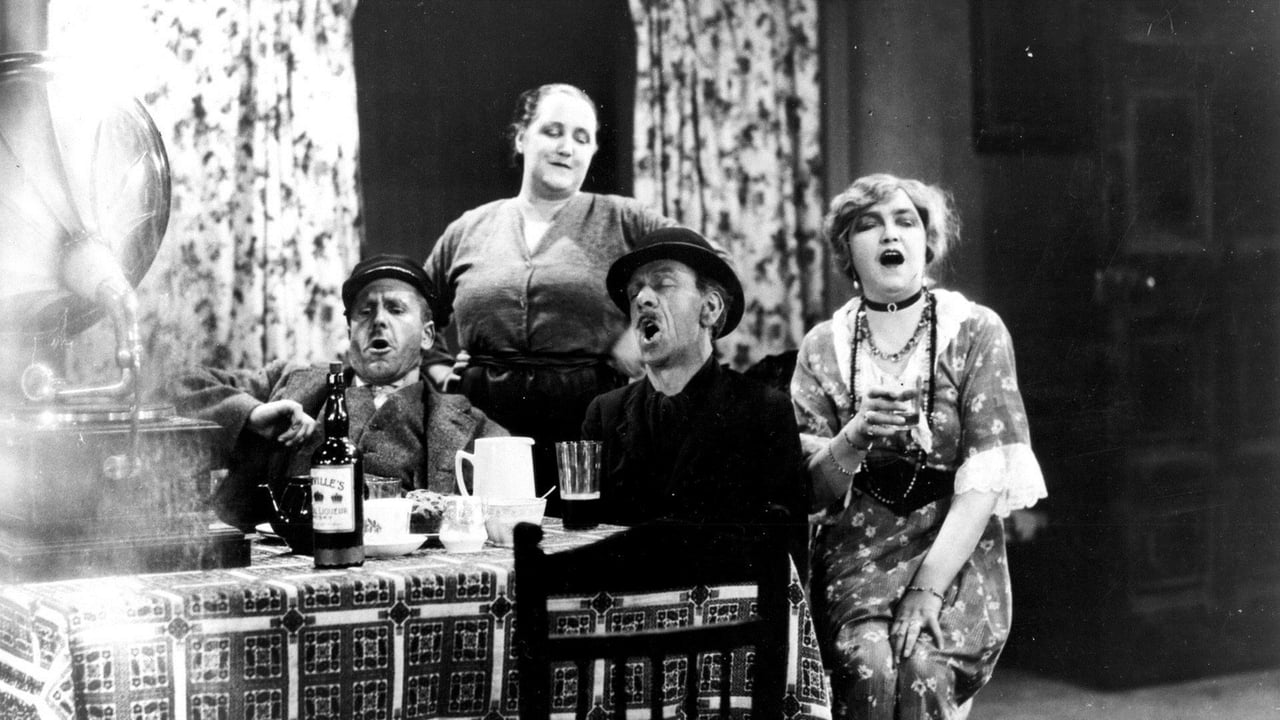JohnHowardReid
"Juno and the Paycock is available on at least six DVD labels plus a VHS tape. The best quality is provided by the tape which unfortunately is missing the conclusion of the final scene. Therefore I recommend the St Clair copy which chops off heads occasionally and has two or three poorly graded images at the beginning. "Juno and the Peacock" (or Paycock) is not a movie that most Alfred Hitchcock fans will enjoy, being rather stagey, downbeat and slow- moving, but it does preserve the fine, stagey performances by Edward Chapman (as the Paycock, unrecognizable here in his film debut), Sidney Morgan (the Abbey player, NOT the director as IMDb once contended - I assume they have now corrected this error), Kathleen O'Regan, John Laurie (movie debut), and Sara Allgood. Although filmed for the most part in long takes, Hitch has opened the play up a bit, which certainly helps the pace. And Jack Cox photographed in his usual all-gray, no-whites-no-blacks style, which certainly contributes to the downbeat air.
Smoreni Zmaj
Hitchcock second sound feature is drama/comedy based on dialogues. There's no much to see. They speak with strong Irish accent and sound is bad cause movie is old, so I understand almost nothing at all. I could not find any links for downloading or watching online, except on YouTube, but without subtitles I gave up after 20 minutes. If anyone have this or know where to find it with subtitles in either English or Serbian I would be very grateful. :(boredragon@gmail.com
ElMaruecan82
"Juno and the Paycock" is not a Hitchcock film, this is a film that 'happens to be' directed by Hitchcock. The difference is simple: the film is such a faithful adaptation of Sean O'Casey's successful play of the same title that he can stand as the film's honorific director. This is not to discount Hitchcock's contribution but the Master had his three-decade streak coming so this can be seen as an early warm-up with the then-rising sound technology, but the film is as close to Hitch' universe as Walt Disney is to Russ Meyer.The story is about a dysfunctional family, the Boyles, the father is a loafer who spends time drinking with his friend (and efficient comic-relief) Joxer and talking about his 'glorious' naval past (he's nicknamed Captain, but his tendency to exaggerate his stories doesn't fool anyone). And there's Juno, the responsible and mature housewife, played by Sara Allgood, she was the matriarch in "How Green Was my Valley" but this is where the comparison ends. While John Ford's nostalgic journey in the Welsh country was painted with the beatifying light of nostalgia, "Juno and the Paycock" is a challenge to all the stereotypes about the Irish Family that movies have been nurturing for years, no kids that can be counted by the dozen, no Catholic overzealous devotion, no noble-hearted poor and no men of virtue.For some strange reason, we tend to idealize the past, confident that it was a time where men were men, and women women, time where people fulfilled their duties. We also tend to idealize the spirit of poor people, as if the lack of money was compensated by the gold in their heart. Rubbish, mediocrity is timeless and has no social barriers, the poorer, the more bitter these people get. And the least Captain Boyle works the least he wants to work again and only counts on his woman to carry the house. Sean O'Casey makes a play of high sociological value, setting the story in one of these brownish tenements our memories usually borrow from Jim Sheridan's movie or sketches about Irish community. And the dysfunctional aspect of the family, that slap in the face, also extends to the Irish context.The film is set in the midst of the Civil War and it's not just a colorful detail as it opens with a long oration from Barry Fitzgerald praising the people's courage. This is where Hitchcock's sense of humor shows its head, the many close-ups on the ugly mugs shows a funny contrast between the speech and the reality, and then the reaction from the gunfights says a lot about these men's spirit. The opening sets the tone: this is a film set in a world where men have ceased to prove their value and woman carries the cross. The only seemingly positive male character is Johnny; the son who just lost his arm in a fight yet seems to hide a more painful wound. Another man is courting Mary, the daughter, but she's in love with a young solicitor named Bentham and he's got good news for the Boyles.The second act deals with the inheritance, a cousin leaves his fortune to Boyle whose reflex is to immediately snub his buddy, if money can't buy love, it can't bring much dignity. The Boyles start buying fancy furniture, show off their fortune, enjoys the music from their gramophone and while a funeral procession pass near their house, even Juno can't empathize with a mother mourning her son, also killed in the war. It says a lot about the way wealth conditions our behavior and clouds our empathy. The Boyles discuss with Bentham matters of religion, wondering what can exactly fascinate people in this. For all the Catholic faith we supposed Irish people are impregnated with, here is an Irish playwright giving us a glimpse of how malleable their faith are, like everyone's.Even while recalling his pasts on the boat, Boyle remembers the question he used to ask himself "what brings the stars?" God doesn't strike as an obvious answer, a loser is likely to lose his faith
and loses it more when luck strikes. Naturally, the third act will change everything, a mistake from Bentham will prevent them from getting the money, out of shame, he'll leave Mary pregnant, as for Johnny, he'll be taken away for reasons explaining his torment all through the film. Boyle is treated like dirt by the tailor and the female neighbor, both come to take the stuff he bought by credit, and when he goes to buy his last drink with Joxer, as if nothing happened, only Juno stays with Mary, instead of one father, she'll have two mothers, and this is one of the greatest quotes I've ever heard in a film.The film ends on the poignant eulogy of faith, in an empty room emphasizing the isolation of men when adversity becomes too hard to handle, and this is the irony of faith, too much troubles make us question it, and sometimes, we're so desperate, we need something to hook on, not to drown in an ocean of desperateness. Mary doesn't believe in God, but Juno has a good answer "what can God do with men's stupidity?" one might think if God is so powerful, he should prevent it, but even Einstein had a few wise words about the unlimited aspect of men's stupidity."Juno and the Paycock" was a revelation to me, a real slap in the face. It has nothing to do with Hitch' canon yet the fact that it is associated with Hitchcock's name is the film's ironic blessing because this is exactly why most movie buffs will be curious enough to discover one of 'Hitchcock's earlier films, so maybe apart from Irish or British people, thanks to Hitchcock, the work of Sean O'Casey will never totally sink into oblivion.
Michael Rhodes
Juno and the Paycock is about a group of people in Dublin sometime during the Irish Civil War (1922-1923). Two of them are alcoholics who have grand goals and plans but never do anything to realize these dreams due to them being incredibly lazy. They are told that they are to receive a large sum of money from a dead relative so they go out and spend a lot of money to celebrate early. However, they spend it before they actually receive the money plus both sides in the Irish Civil War start to gain distrust for the group so who knows what could happen. Basically the film follows the plot of the 1924 play of the same name and the problem is that it doesn't work very well in a movie format. Almost the entire film takes place within a single room which can get incredibly boring and not very much really happens throughout the movie that is even mildly entertaining when it comes to the plot.The acting in the film is abysmal. Edward Chapman plays Captain Boyle who is always grumpy and mean which makes him an incredibly unlikeable character. He isn't very well acted either because he comes off as more annoying to the viewer than anything. Maire O'Neill plays Maisie Madigan, another uninteresting character without any depth whatsoever. All other actors in the film are also pretty unspectacular and aren't entertaining in the slightest. The script doesn't allow for any characters to have any depth plus they are badly acted anyway.When it comes down to the special effects I shall reiterate that the whole movie is pretty much in the same room so it's mostly just one set. And this set is a simple apartment without anything interesting or exciting. And there are no noticeable special effects throughout the movie. As for the musical score: it is lacking and really makes my ears bleed! The worst part with this would have to be the few sections in the film where characters attempt to sing which is truly some of the worst sounds that I have ever heard coming from anything at any time.In conclusion, this is one of the worst films that I have ever seen in my entire life and there isn't a single redeemable quality in it. The storyline is incredibly boring and doesn't work well outside of being in a play, the acting is atrocious, there aren't any special effects, and the music makes me want to mute my television. Some movies are bad but have a cheesy factor to them which can make them entertaining when you are in the right mood. And some movies are so bad that it actually makes them entertaining, but this film is truly at the rock bottom of cinema. No matter what way you look at it there is no possible way to get any entertainment out of this movie. Avoid it at all costs. Score: 0/10


 AD
AD


